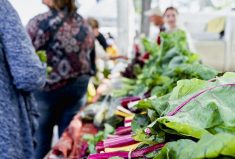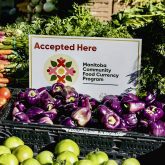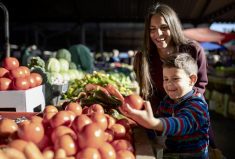Community groups are concerned that a program that put fresh local food on the tables of food-insecure households may not be able to run this year due to lack of financial support.
“It was an amazing program,” said Kayla Chafe, outreach co-ordinator at South Winnipeg Family Information Centre, which participated in 2021.
The Manitoba Community Food Currency Program, run by Direct Farm Manitoba, provided vouchers to low-income or food-insecure families that they could then spend like cash at participating farmers’ markets.
Read Also

Manitoba boosts stake in cereals centre to $20 million
Premier Wab Kinew said the additional project funds will help ‘Trump-proof’ the provincial economy.
Direct Farm Manitoba reimbursed vendors for vouchers they accepted.
The program began as a pilot in 2020 and expanded by 60 per cent in 2021 with funding support from the Winnipeg Foundation and the province.
It distributed $69,000 in vouchers through partner community groups like South Winnipeg Family Information Centre and Many Hands Resource Centre in Morden. Nearly 99 per cent of vouchers given out were redeemed, Direct Farm Manitoba said.
However, this year Direct Farm Manitoba hasn’t been able to secure funding for the program, said executive director Kristie Beynon. If they didn’t secure support within two weeks, the food currency program likely wouldn’t go forward, she said on May 3.
Families and seniors are already asking if the program will be back this year, Chafe said.
“They felt like it was like Christmas,” she said.
Chafe distributed vouchers every two weeks to about 20 families and seniors, she said. Households received between $25 and $75 based on size and need.
A small grant also allowed the organization to help families pay for transportation to the St. Norbert Farmers’ Market.
Many Hands Resource Centre distributed $24 in vouchers per week to about 75 program participants, said Tracey Krause, the centre’s program co-ordinator.
“It’s not a lot, but certainly it’s a lot of tomatoes and cucumbers and onions and potatoes,” she said.
Response from participating families was enthusiastic, Krause said. She quoted a survey of participants done at the end of last year.
“I learned how to budget my income and currency from the program. Mostly I bought food for my kids,” said one patron.
“I tried new foods and experienced kind people,” another said.
Favourite parts of the program included “meeting the vendors with a great attitude and a big smile” and “knowing there are people who care about us and help us in our difficult times,” participants said.
Benefits of the program went beyond food on tables, said Krause and Chafe.
“This is so beautiful because you get to go to the market,” Chafe said. “It’s not just food but it’s like the experience as well of having that pride of getting to support your community and support yourself.”
“We see a lot of diabetes here in Morden, especially among the food insecure,” Krause said. “This kind of really fresh fruits and vegetables, it helps.”
Freedom to choose food as they see fit is also a benefit for families facing poverty, said Chafe. Shopping for nourishing food that suits them instead of getting a hamper helps reduce the shame or embarrassment they may feel.
“It’s just a win win win – it’s a win for farmers. It’s a win for food-insecure households, and it’s a win for communities,” Beynon said.
Funding allows low-income families to buy food from often smaller-scale farmers, who then take that income back to rural communities, said Beynon.
“It’s provincial dollars spent twice, basically,” she said.
In 2021, the food currency program had more interest than funding could support, Direct Farm Manitoba said in an April 28 news release.
It had anticipated “significantly growing the program in 2022” and had asked the province for direct provincial investment of about $350,000 to help 700 households in Manitoba.
Direct support, as opposed to grants, would give the program stability, Beynon explained.
Similar programs in Nova Scotia and British Columbia receive steady provincial support, she added.
















